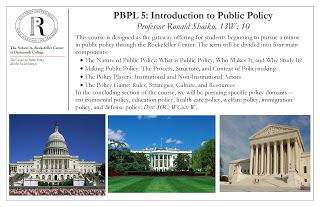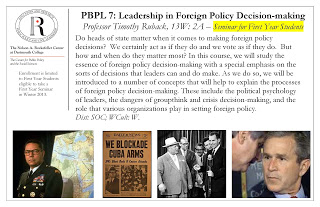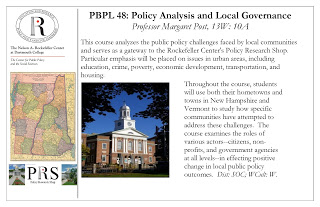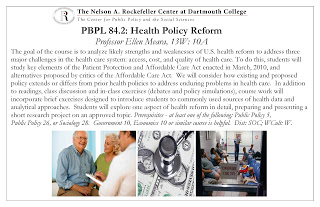- Public Policy
- Leadership
- Funding
- News & Events
- About the Center
Back to Top Nav
Back to Top Nav
Back to Top Nav
Back to Top Nav
Looking for winter 2013 courses to add to your schedule? Here's a cheat sheet on your options for Public Policy - open to all majors and minors!
If you are a first-year student, consider the first-year seminar (PBPL 7) or Introduction to Public Policy (PBPL 5), which is a required course if you are interested in applying for our First-Year Fellows Program.
Policy Analysis and Local Governance (PBPL 48) is one of the gateway courses for our Policy Research Shop. If you are interested in learning more about the Public Policy Minor, click here.

This course is designed as the gateway offering for students beginning to pursue a minor in public policy through the Rockefeller Center. The term will be divided into four main components:
I. The Nature of Public Policy: What is Public Policy, Who Makes It, and Why Study It?
II. Making Public Policy: The Process, Structure, and Context of Policymaking
III. The Policy Players: Institutional and Non-Institutional Actors
IV. The Policy Game: Rules, Strategies, Culture, and Resources
In the concluding section of the course, we will be pursuing specific policy domains—environmental policy, education policy, health care policy, welfare policy, immigration policy, and defense policy.
Dist: SOC; WCult: W.


More than one in ten Americans lives in poverty according to official statistics. This course explores the nature and extent of poverty in the United States and the role of the government in addressing poverty issues. How do we measure poverty? Why does poverty persist? Why is there so little political discourse about poverty in America today? How effective are various poverty alleviation programs? Dist: SOC; WCult: W.
Finding answers for many complex foreign policy questions requires weighing a set of political goals against an estimate of the potential military costs and risks. The purpose of this course is to familiarize students with the missions and capabilities of military forces, and to teach them how to estimate the likely costs, risks, and outcomes of military operations. This course will use theoretical works and historical cases to familiarize students with some of the principles of air, ground, and naval operations. Students will use the tools which they learn in class to conduct a detailed military analysis that bears on an important current foreign policy question. No prior knowledge of military forces is needed for this class. Prerequisite: Government 5 or permission of the instructor. The instructor encourages seniors, juniors, as well as sophomores with strong writing and research skills, to enroll in this seminar. Dist: SOC or INT.

This course offers an opportunity for a student enrolled in the Public Policy Minor to do advanced, independent work under the direction of a faculty member in the area of public policy. The topic under study may relate to prior coursework in the Public Policy Minor, an off-campus internship, or a co-curricular activity sponsored by the Rockefeller Center. All students enrolled in Public Policy 91 in a given term should expect to meet regularly together for classroom instruction and discussion with Rockefeller Center faculty and staff. To enroll, a student must prepare a brief proposal that describes the topic to be studied, its relationship to the student's prior public policy courses or activities, and the student's goals for undertaking the research. Prerequisites: Public Policy 5 and the Research Methods course prerequisite to the Public Policy Minor.